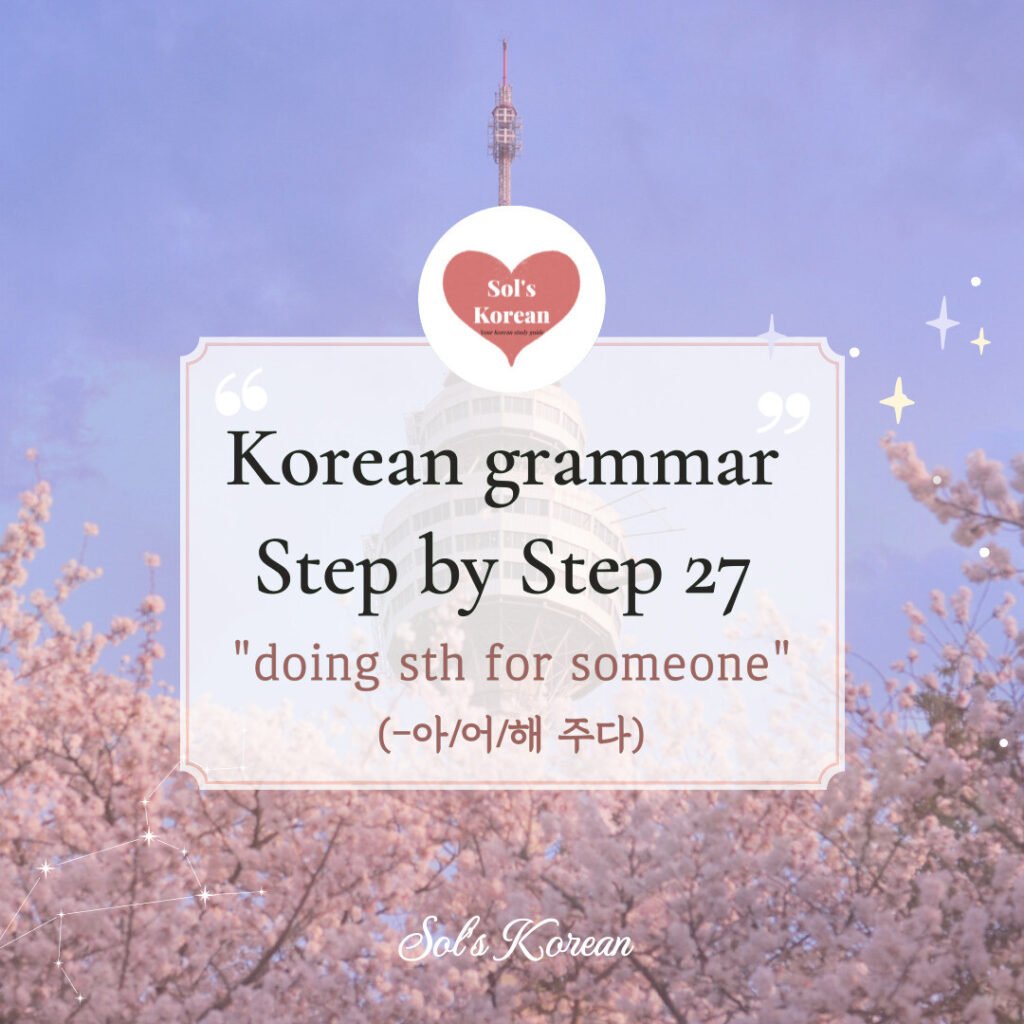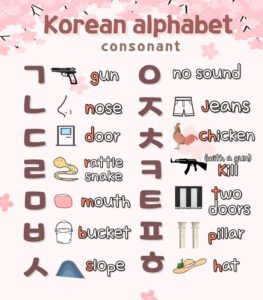-아/어/해 주다 Grammar | doing something for someone
Today, we’re going to learn about the grammar pattern -아/어 주다 grammar!
Do you remember when we studied the expression 을/를 위해서 to say “for me” or “for someone”? Similarly, -아/어 주다 can also be used to express doing something for someone. Unlike 을/를 위해서, -아/어 주다 functions as a verb ending and is much more common in daily conversation.
Let’s explore the key differences and learn how to use it properly!
Part 1,
Let’s grasp the concept of grammar
아/어/해 주다 : to do something for someone else.
The verb 주다 means “to give,” but in this case, it combines with action verbs to emphasize that the action is performed for someone.
How to Form “주다 grammar”
To form 주다, start by conjugating the main verb and then adding 주다 to the verb stem. Here’s how it works:
We conjugate the verb into the present tense, remove “요,” and then add 주다
■ 요리하다 (to cook) → 요리해 주다 (to cook for someone)
■ 사다 (to buy) → 사 주다 (to buy something for someone)
■ 운전하다 (to drive) → 운전해 주다 (to drive for someone)
■ 가르치다 (to teach) → 가르쳐 주다 (to teach for someone/for their benefit)
■ 설명하다 (to explain) → 설명해 주다 (to explain something to someone)
■ 읽다 (to read) → 읽어 주다 (to read for someone)
🐻❄️ More examples 🐻❄️
필요한 거 있어? 내가 사 줄게
“Do you need anything? I’ll buy it for you.”
가르쳐 줘서 감사합니다
“Thank you for teaching me.”
✓ To express “thank you for ~” in Korean, we use the -아/어/해서 grammar, which essentially means “because (you did something), I’m grateful.”
– 와 줘서 감사합니다 “Thank you for coming.”
– 요리해 줘서 감사합니다 “Thank you for cooking.”
엄마, 책 읽어 주세요. 잠이 안 와요
“Mom, please read me a book. I can’t sleep.”
이거 설명 해 줄 수 있어요?
“Can you explain this for me?”
Common Expressions with 주다
Here are some phrases you’ll hear often:
알려 주다 (to let someone know)
보여 주다 (to show someone)
데려다 주다 (To take someone somewhere/ to drop someone off.)
데리러 와 주다 (To come pick (someone) up)
* 데리러 오다: to come pick (someone) up.
* “데리러 오다” and “데리러 와 주다” are basically the same, but adding ‘주다’ adds a kinder, more polite nuance.
말해 주다 (to tell someone)
Different ways to say “Tell me“.
we will combine 말하다 (to speak/tell) + 주다 (to do something for someone)
말해 줘(casual) / 말해 줘요(neutral) / 말해 주세요(polite)
👍
When you’re in a formal setting and want to be polite, you can change 주다 to 드리다 (a polite way to say “give”). Just switch 주다 to 드리다!
데려다 주다 (to drop someone off) → 데려다 드리다
Example: 제가 할머니 데려다 드릴게요. (I’ll drop off my grandmother.)
알려 주다 (to let someone know) → 알려 드리다
Example: 나중에 알려드릴게요. (I’ll let you know later, speaking to elders.)
사 주다 (to buy something for someone) → 사 드리다
Example: 제가 시어머니 선물 사 드릴게요 (I will buy a gift for my mother-in-law.)
But we’ve already studied ‘을/를 위해서’ to express ‘for someone.’ So, what’s the difference?
The main difference is that the 주다 ending is more commonly used than 을/를 위해서 because 위해서 puts more emphasis on ‘for’ someone.
Look at this example!
I will cook for you :
1) 내가 요리해 줄게 2) 내가 너를 위해 요리해 줄게 3) 내가 너를 위해 요리할게
1) The most commonly used form. To express “for you,” we simply change the ending and combine it with 주다.
2) In this case, we’re expressing “for you” twice—once with 너를 위해 (for you) and once with 요리해 주다. I’d use this only when I really want to emphasize that I’m doing it for you!
3) You can say this as well, but it’s the least common form
Using 주다 with negative sentences
We can use 주다 with negative sentences to make a polite request asking someone not to do something as a favor to you.
In the last class, we learned how to say ‘don’t-!’ and we can add 주다 there,
which means ” don’t do this for me” or “as a kindness.”
문을 닫지 마요! Don’t close the door
-> 문을 닫지 말아 주세요. “Please don’t close the door.”
*Adding 주다 changes the tone to ‘Please don’t close the door.’ It makes the request sound much more polite and considerate.
이거 버리지 마요! Don’t throw this away.
-> 이걸 버리지 말아 주세요. = “Please don’t throw this away.”
*It adds a nuance of kindness or a request being made for the speaker’s benefit.
너무 크게 말하지 마세요 Please don’t speak too loudly.
-> 너무 크게 말하지 말아 주세요. Please don’t speak too loudly.
*Adding 주다 softens the tone, making the request sound more polite or considerate!
Part 2,
Practice making sentences #1
1. Show me that too!
2. Please tell me. I’m so curious! (casually)
(to be curious: 궁금하다)
3. Thanks for always studying hard with me.
(always: 항상/ hard: 열심히)
4. Can you please buy this for me??🥺. I’ll pay you back immediately when I get paid.
(pay back: 갚다 / immediately:바로 / get paid = get a paycheck: 월급 받다)
5. In foreign countries, people open the door for others. In Korea, no one opens the door (for you).
(foreign countries: 외국 / open: 열다/ others: 남들 /no one: 아무도)
6. Could you explain this again?
(explain: 설명하다)
7. Thanks for picking me up. Next time, I’ll come to get you! (casually!)
(pick me up: 데리러 오다/ next time: 다음번 / to go pick (someone) up: 데리러 가다)
8. Since it’s our anniversary today, I’ll cook dinner for you. (casually!)
(anniversary: 기념일)
9. Please take out the trash. Also, clean the house (for me).
(take out the trash: 쓰레기(를) 버리다 / clean: 청소하다)
10. Please let me know the date again. I couldn’t hear it earlier.
(date: 날짜/ again: 다시/ earlier; 아까 전에)
Thy these on your own first, before checking the answers!
1. Show me that too!
나도 그거 보여 줘요!
• 보이다 is a verb meaning “to be visible” or “to be seen” (without specifying the subject directly).
– 잘 보여 “Oh, I can see it well!” (literally, “Oh, it shows well.”)
– 저기서 내가 잘 보일까? “Will I be seen clearly from there?”
– 이 그림이 잘 보여요. “I can see the picture clearly” / “This picture is easy to see.”
To say “Show me”, we always combine the verb 보이다 + 주다, which becomes 보여주다.
• 보여 줘(informal) 보여 줘요(neutral) 보여 주세요 (polite)
2. Please tell me. I’m so curious! (casually)
(to be curious: 궁금하다)
말해 줘, 너무 궁금해!!
• To express “Tell me”, we use the verb 말하다 (to talk, speak) + 주다 grammar, which becomes 말해 주다.
• 너무 means “too” or “very,” but you can also say 진짜 or 정말 to express something like “so” or “really.” For example, 진짜 궁금해 or 정말 궁금해 both mean “I’m so/really curious.”
3. Thanks for always studying hard with me.
(always: 항상/ hard: 열심히)
항상 나랑 열심히 공부해 줘서 고마워요/감사합니다.
• I’d say this to my students: Thank you for studying hard! To express ‘thank you for,’ we use the 아/어/해서 grammar, which literally means: ‘Because you studied hard (for me), I’m very grateful.’
• 고마워요 is slightly more casual than 감사합니다!
4. Can you please buy this for me??🥺. I’ll pay you back immediately when I get paid.
(pay back: 갚다 / immediately:바로/ get paid = get a paycheck: 월급 받다)
나 이거 사줄 수 있어요? 월급 받으면 바로 갚을 게요!
• To express “buy for me,” we use 사다 (to buy) + 주다 (for someone), which becomes 사 주다!
• To express “can,” we use the grammar -을 수 있어요. 🙂
• You can also use 월급 받을 때 as an alternative, and it’s interchangeable!
– 월급 (monthly paycheck) = 월 (month) + 급여 (wages)
– 주급 (weekly paycheck) = 주 (week) + 급여 (wages)
• Here, I’ll use the -게요 ending since I’m responding to someone.
5. In foreign countries, people open the door for others. In Korea, no one opens the door (for you).
(foreign countries: 외국 / open: 열다/ others: 남들 / no one: 아무도)
외국에서는, 사람들(이) 남들을 위해 문(을) 열어 줘요. 한국에서는, 아무도 문(을) 안 열어 줘요.
• To express “for others,” we use 을/를 위해서 (for the sake of). When we want to say “for you,” simply using the -주다 ending can cover the same meaning. But, when the recipient is not clear, we tend to specify the object or target of the action.
• To express “contrast,” I will use the 은/는 particles after 외국에서 (abroad) and 한국에서 (in Korea) to show difference.
• To say “no one does something,” we need to use 아무도 + 안 together. The same structure applies for “never” or “nothing.”
– I never eat: 나 아예 “안” 먹어요
– I do nothing : 나 아무것도 “안” 해요
6. Could you explain this again?
(explain: 설명하다)
이거 다시 설명해 줄 수 있어요?
• 설명하다 + 주다 (for me) → 설명해 주다 (explain it for me!)
• To express “could,” we can use the “can” grammar structure, -을 수 있어요.
7. Thanks for picking me up. Next time, I’ll come to get you! (casually!)
(pick me up: 데리러 오다/ next time: 다음번 / to go pick (someone) up: 데리러 가다)
(나) 데리러 와 줘서 고마워, 다음번에 내가 데리러 갈게!
• Guys, I know, haha, “pick someone up” can be expressed in various ways. When you’re going to pick someone up, since you’re going, we use 가다. It’s 데리러 가다.
When someone is coming to pick you up, that person is coming for you, so we use 오다 (to come) + 주다.
데리러 오다: When someone comes for you.
데리러 가다: When someone goes to pick someone up.
We usually use the 주다 grammar with 데리러 오다/가다 because someone is doing it for you. You can use 데리러 오다/가다 or 데리러 와 주다/가 주다 interchangeably—they sound almost identical to me.
And I’m sorry, but “dropping someone off” is 데리다 주다, haha… We have to memorize them all separately.
8. Since it’s our anniversary today, I’ll cook dinner for you. (casually!)
(anniversary: 기념일)
오늘 우리 기념일이니까, 내가 저녁 요리 해 줄게.😊
• Okay, to express “since” or “because,” we’ve studied the 아/어/해서 grammar, which is commonly used with verbs. However, when because is followed by a noun, and you want to emphasize “because,” we use -(이)니까. I will cover this grammar in more detail soon!
When a noun ends in a batchim, we use 이니까, and when it ends in a vowel, we use 니까.
Because it’s your birthday: 생일이니까
Because it’s a surprise!: 서프라이즈니까
You can also use 기념일이라서 as well!
9. Please take out the trash and clean the house (for me).
(take out the trash: 쓰레기(를) 버리다 / clean: 청소하다)
쓰레기 버리고 집 청소해 주세요.
• To connect actions with “and,” we can use 고, and we only conjugate the last verb when using 주다.
• 청소하다 + 주다 → 청소해 주다
• 청소해 줘(casual) / 청소해 줘요 are also possible!
10. Please let me know the date again. I couldn’t hear it earlier.
(date: 날짜/ again: 다시/ earlier; 아까 전에)
날짜 다시 알려 주세요. 아까 전에 못 들었어요.
• To let someone know, we always use 알려 주다. Just memorize it as it is!
• To say “earlier,” you can say 아까 전에. For short, we also say 아까(a bit more casual)!
“The best way to predict the future is to create it.”








